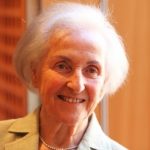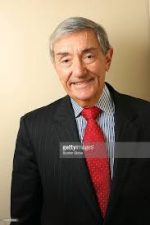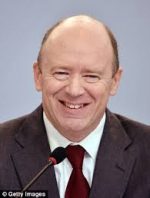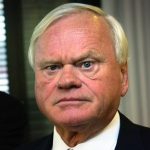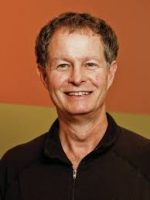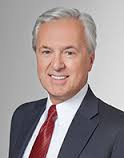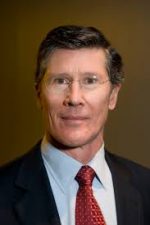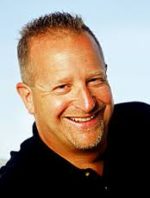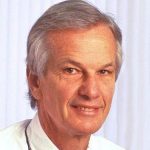She comes from one of the richest families in Europe. She owns 17 percent of BMW, which she inherited when her husband passed away. She used to serve as part of the company’s Board of Supervisors. She is extremely active in socio-political affairs, pushing for initiatives in the fields of learning and journalism. She is also a supporter of research institutions on child cancer.
John A. Kaneb is the Chairman of the Board of Directors and CEO of HP Hood LLC as well as the president of the Catamount Companies.
Education and Service:
Kaneb graduated from Harvard College with a Bachelor of Arts Degree in Economics in 1956. From 1957-59, he served in the United States Navy.
Career:
Kaneb bought a controlling interest in Gulf Oil and tripled its sales to US$4.6 billion before selling it in 2005. The Kaneb family acquired HP Hood LLC in 1995 and increased its annual sales from US$600 million to about US$2.3 billion. Kaneb is also part owner of the Boston Red Sox; Hood blimps are often seen over home games.
Positions and appointments:
Besides his business work Kaneb is a Trustee Emeritus of the University of Notre Dame. He is also an Emeritus Trustee of the Massachusetts General Hospital and Emeritus Trustee and former Chairman of the Board of McLean Hospital. He has worked on other boards and groups including the Board of Fellows of the Harvard Medical School. He was appointed by President George W. Bush to serve on the National Prison Rape Elimination Commission in 2004.He is currently the vice-chair of that commission.
Kaneb is also Vice Chair Emeritus of the Finance Council, Chairman of the Clergy Funds Board and Vice Chair of the Catholic Schools Council of the Roman Catholic Archdiocese of Boston. He served as Trustee Emeritus and Finance Committee Chair at Partners Healthcare from 1994-2000. Kaneb is a member of Harvard University's Executive Committee on University Resources.
John Michael Cryan (born 16 December 1960) is a British businessman and co-chief executive of Deutsche Bank AG in Frankfurt am Main, since 1 July 2015.
Early life:
John Michael Cryan was born in Harrogate on 16 December 1960. He is a graduate of the University of Cambridge.
Career:
Cryan worked for Arthur Andersen and then joined S.G. Warburg in London in 1987, before he was appointed group chief financial officer at UBS AG in September 2008. Cryan was head of UBS's financial institutions group. In the autumn of 2008, he advised the UBS Board of Directors and the Group Executive Board on the financial crisis.
In 2011 Cryan left UBS for personal reasons. In January 2012, he joined Singapore's investment company Temasek as president for Europe.
He is a non-executive director of Man Group since January 2015.
Cryan was appointed co-chief executive officer of Deutsche Bank in June 2015. He will share the position with Jürgen Fitschen until May 2016.
Personal life:
Cryan and his wife Mary purchased a home in Annapolis, Maryland, US, in 2009. They have a home in London as well, and no children. He speaks German fluently.
Mr. John Dixon has been Chief Executive Officer of David Jones Limited at Woolworths Holdings Limited since January 2016. Mr. Dixon served as an Executive Director of General Merchandise at Marks & Spencer Group plc from October 1, 2012 to July 2015, and also served as Member of its Management Board. Mr. Dixon served as an Executive Director of Food of Marks & Spencer Group plc since September 2009 and its Head of Retail since July 2012. Mr. Dixon served as a Director of M&S Direct at Marks & Spencer Group plc., and also served as its Director of Food since July 2008 and as Director of e-Commerce. Mr. Dixon served as an Executive Assistant to the Chief Executive of Stuart Rose since 2004. He served as an Executive where he headed up one of the three Food trading divisions comprising the fresh food categories since 2002. Mr. Dixon started his Marks and Spencer career in UK store management before moving to Paris for three years where he held a variety of commercial management roles in European stores and the Paris Head Office. Mr. Dixon joined UK Head Office in 1992 as a Food buyer in Prepared Foods, followed by Fresh Produce and Bakery before progressing to Category Manager of Fresh Produce. Mr. Dixon served as an Executive Director at Marks & Spencer Group plc from September 09, 2009 to July 2015.
John Dixon was until recently tipped as a top contender to replace the group chief executive, Marc Bolland. Dixon will be replaced as head of general merchandise by Steve Rowe, who was the head of food.
M&S revealed last week at its annual general meeting that its clothing and homeware sales had slipped again in the last three months.
In April, Dixon’s division unveiled its first rise in clothing sales for four years. Bolland, said sales of womenswear, menswear, childrenswear and home furnishings had all increased as shoppers perceived an improvement in style and quality at the chain.
But just a few weeks later, as Bolland unveiled the chain’s annual profits, he described the poor performance of Dixon’s non-food business during the previous 12 months as “not good enough”.
At the AGM, Bolland had to unveil a new decline in sales, bringing what some analysts had believed was a long-awaited reversal in the retailer’s fashion fortunes to an abrupt halt. And the decline could have been far worse but for buoyant sales online. Nick Bubb, a retail analyst, estimated that had it not been for the online boost, the underlying sales decline would have been up to 5%.
The new finance director, Helen Weir, and the store’s online boss, Laura Wade-Gery, are also said to be keen to take the top job. Dixon, who is estimated by Bloomberg to be earning £1m a year, has run the clothing and homewares business since 2012, when Kate Bostock left the post after a slump in sales. He had previously achieved a turnaround in the food business.
Dixon, whose father also worked for M&S, started on the bottom rung of the retailer’s business, moving on to become a food buyer.
By 2004 he had caught the eye of the then chief executive Stuart Rose, and was promoted to become his executive assistant. Dixon joined the board in September 2009 as head of food.
There has been recent speculation that Bolland is preparing to move on. He was previously chief executive of Morrisons and before that one of the most senior executives at Heineken.
At the recent shareholders’ meeting he faced a verbal onslaught from shareholders including Muriel Conway, who spent 25 years designing womenswear for M&S until the late 1990s. She said: “I could weep at what I see in stores today. Where’s the originality, flair, newness and good taste? The necklines are too low and the polos too high.”
In a statement on Thursday, Bolland thanked Dixon “for his contribution to the business” and said he was “delighted to appoint Steve [Rowe] to the role of executive director, general merchandise.”
Dixon said: “I have thoroughly enjoyed many happy and successful years at M&S. I now have the opportunity to become a chief executive and have therefore resigned from this great company.”
Dixon, whose father also worked at M&S, said: “I’m very excited to be taking on this role as CEO of David Jones. It’s a substantial business in its own right and lies at the heart of Australian society … I’m thoroughly looking forward to the challenge and my family and I are looking forward to living in Sydney. It’s a perfect fit for me.”
Dixon came to prominence at M&S after he caught the eye of Stuart Rose, the former chief executive, and became his executive assistant in 2004. He was promoted to M&S’s board as director of food five years later. After leading a successful turnaround of the food operations he moved to general merchandise.
His surprise departure came amid speculation that he had become frustrated with M&S after Steve Rowe, an internal rival, replaced him as the man viewed as most likely succeed Marc Bolland as chief executive. Rowe has since taken over Dixon’s job as head of clothing and homewares. There have been persistent rumours that Bolland is preparing to depart soon.
Ian Moir, chief executive of David Jones’s South African parent company, Woolworths Holdings, said: “John is a world-class retailer who brings with him a powerful combination of international food and fashion expertise supported by large scale retail systems and management experience.
“We have known John for many years through our close relationship with M&S and know him to be an inspiring and resilient leader who has traded successfully through the most difficult and competitive of conditions in the UK.”
His appointment is thought to be linked to David Jones’s plans to launch an up market food business.
Dixon joins a string of UK retail executives who have moved to Australia. Archie Norman kicked off the turnaround of Coles, the Australian supermarket business, where he brought in former Asda and Halfords executive Ian McLeod as managing director.
McLeod moved up to join the board of Coles’s parent company, Wesfarmers, before leaving to join the US supermarket chain Bi-Lo in January.
Former New Look, Littlewoods and Matalan boss Alistair McGeorge was hired to lead the Big W department store chain, but departed last month after less than a year in the role.
He was born in Norway but took up citizenship in Cyprus in 2006. He is the owner of the largest oil tanker fleet in the world. He also owns Meisha and Hemet Holdings, an investment company. He also controls Frontline, Golar LNG, SeaDrill, Golden Ocean Group and Deep Sea Supply.
John Mackey (born August 15, 1953) is an American businessman. He is the current co-CEO of Whole Foods Market, which he co-founded in 1980. Named the Ernst & Young Entrepreneur of the Year in 2003, Mackey is a strong supporter of free market economics, has strong anti-union views, and co-wrote the best-selling book Conscious Capitalism, which was released in 2013. He is one of the most influential advocates in the movement for organic food.
Early life and education:
Mackey was born on August 15, 1953 in Houston, Texas, to Bill and Margaret Mackey. He has a sister and a brother.
Mackey was a student of philosophy and religion at the University of Texas at Austin and Trinity University in the 1970s, and worked at a vegetarian co-op. Mackey spent almost six years studying various topics, deciding to focus solely on his interests and not purely seek out a degree. Mackey credits his generalist approach to learning as the main reason he was able to be successful in business. Mackey's thoughts on being a generalist appear to be backed up by Edward P. Lazear an American Economist who studied factors that lead to being a successful entrepreneur. Mackey who was a vegetarian for 30 years, now identifies as a vegan.
Career:
Mackey co-founded his first health food store, SaferWay, with his girlfriend Renee Lawson (Hardy) in Austin in 1978. They met while living in a vegetarian housing co-op. They dropped out of college.
They borrowed $10,000 and raised $35,000 more to start SaferWay. At the time, Austin had several small health food stores. The two ran the market on the first floor, a health food restaurant on the second, and, for a short time, lived in the third story of their building. In two years, they merged SaferWay with Clarksville Natural Grocery run by Mark Skiles and Craig Weller and renamed the business Whole Foods Market. All four (Mackey, Hardy-Lawson, Skiles and Weller) are considered co-founders of the business.
Mackey built Whole Foods into an international organization, with outlets in major markets across the country, as well as Canada and the United Kingdom. Along the way he bought out smaller competitors. In 2007 Whole Foods purchased a major natural foods supermarket competitor, Wild Oats Markets, Inc.
Animal welfare:
hole Foods was the first grocery chain to set standards for humane animal treatment. Mackey was influenced by animal rights activist, Lauren Ornelas, who criticized Whole Foods' animal standards regarding ducks at a shareholder meeting in 2003. Mackey gave Ornelas his email address and they corresponded on the issue. He studied issues related to factory farming and decided to switch to a primarily vegan diet that included only eggs from his own chickens. Since 2006, he has followed an entirely plant-based diet. He advocates tougher animal standards.
Despite Whole Foods' welfare standards, Mackey has been criticized by abolitionist vegans such as Gary L. Francione, who believes the Whole Foods company policies betray the animal rights position. By other accounts, Mackey is the "driving force" behind significant changes in animal welfare. For instance, he started a non-profit foundation, the Animal Compassion Foundation, to address making animal welfare more economically viable. The Animal Compassion Foundation folded in 2008 with the formation of the Global Animal Partnership, a nonprofit organization that is independent of Whole Foods Market. Mackey is on the Board of Directors of Global Animal Partnership. Additionally, he is a board member of Farm Forward, a 501(c)(3) nonprofit organization that implements innovative strategies to promote conscientious food choices, reduce farmed animal suffering, and advance sustainable agriculture, and he has been a member of the Board of Directors for the Humane Society of the United States since 2009.
Letter to employees:
In 2006, Mackey announced he was reducing his salary to $1 a year, would donate his stock portfolio to charity, and set up a $100,000 emergency fund for staff facing personal problems. He wrote: "I am now 53 years old and I have reached a place in my life where I no longer want to work for money, but simply for the joy of the work itself and to better answer the call to service that I feel so clearly in my own heart."
He has instituted caps on executive pay at the company.
Political views:
Libertarianism:
In a debate in Reason magazine among Mackey, economist Milton Friedman, and entrepreneur T. J. Rodgers, Mackey said that he is a free market libertarian. He said that he used to be a democratic socialist in college. As a beginning businessman he was challenged by workers for not paying adequate wages and by customers for overcharging, during a time when he was hardly breaking even. He began to take a more capitalistic worldview, and discovered the works of Ludwig von Mises, Friedrich Hayek and Milton Friedman. Mackey is an admirer of some of Ayn Rand's novels.
Mackey co-founded the organization Freedom Lights Our World (FLOW) to combine his commitments to "economic and political freedom as well as personal growth, social responsibility, and environmental stewardship." He supports such changes as green tax shifts, environmental trusts, world legal systems to allow the poor to create legal businesses, and a citizen's dividend to help the poor in the developed world. The name and focus of FLOW have since become Conscious Capitalism, Inc., which was initially created as a program of FLOW and evolved to the point at which it became the organization's principal focus. In 2010 the name of the organization was formally changed. The Conscious Capitalism Institute was chartered in 2009. In 2010 the original FLOW group merged with the Institute group to become one unified organization.[20] In 2013 Mackey was interviewed in Harvard Business Review's Ideacast podcast about his views on Conscious Capitalism. Mackey said, "If you want to be competitive in the long term, your business needs to have discovered its higher purpose and it needs to adopt a stakeholder philosophy." He eschewed the conventional thinking that "business has to be sort of ruthless and heartless to be successful".
Healthcare reform:
Mackey opposed the public health insurance option that ultimately did not become part of the Patient Protection and Affordable Care Act. Mackey thinks a better plan would be allowing consumers to purchase health insurance across state lines and use a combination of health savings accounts and catastrophic insurance, as Whole Foods does. Mackey's statement that Americans do not have an intrinsic right to healthcare led to calls for a boycott of Whole Foods Market from the Progressive Review and from numerous groups on Facebook. Alternatively, Tea Party movement advocates organized a number of buycotts in support of Mackey's suggestions.
In August 2009, Mackey wrote the editorial in the Wall Street Journal expressing his viewpoints on universal healthcare in the United States. "While we clearly need health-care reform, the last thing our country needs is a massive new health-care entitlement that will create hundreds of billions of dollars of new unfunded deficits and move us much closer to a government takeover of our health-care system," he wrote. He continued: "Many promoters of health-care reform believe that people have an intrinsic ethical right to health care—to equal access to doctors, medicines and hospitals. While all of us empathize with those who are sick, how can we say that all people have more of an intrinsic right to health care than they have to food or shelter?"
In an NPR interview in 2013, Mackey compared the Obama administration's healthcare law to 'fascism' instead of socialism, stating, "technically speaking, it’s more like fascism. Socialism is where the government owns the means of production. In fascism, the government doesn’t own the means of production, but they do control it — and that’s what’s happening with our health care programs and these reforms." The day following the interview, Mackey wrote in a blog post that he regretted having made the remark, stating that he "made a poor word choice to describe [the U.S.] healthcare system." Instead, he called it 'government-controlled health care'
Yahoo! Finance postings:
On July 20, 2007, The Wall Street Journal revealed that Mackey was, for at least seven years, using the pseudonym "Rahodeb" (an anagram of his wife's name, Deborah) to post to Yahoo Finance forums. He referred to himself in the third person and criticized rival supermarket chain Wild Oats Markets. The Federal Trade Commission approved a complaint challenging Whole Foods Market’s approximately $670 million acquisition of its chief rival, Wild Oats Markets, Inc. It authorized the FTC staff to seek a temporary restraining order and preliminary injunction in federal district court to halt the deal, pending an administrative trial on the merits. After an extensive regulatory battle with the FTC, a federal appeals court consented to the deal. Whole Foods officially completed their buyout of Wild Oats on August 27, 2007.
In May 2008, after an SEC investigation cleared him, Mackey started blogging again. In a 2,037 word post, he wrote about why he began blogging in the first place and how his upbringing drove him to defend himself and Whole Foods. He admitted he made a mistake in judgment, but not in ethics.
Resignation as chairman:
On December 24, 2009, Mackey resigned from the position of Chairman of the Board of Whole Foods Market, a position he held since 1978. On his blog he said, "John Elstrott will now take the title of Chairman of the Board, which will accurately reflect the authority and the responsibilities that he has had for many years." Mackey remains a member of the Board of Directors.
John Gerard Stumpf (born September 15, 1953) is an American business executive and investment banker. He is the current chairman and chief executive officer of Wells Fargo, one of the Big Four banks of the United States. He became chairman in January 2010. He was named CEO in June 2007, elected to Wells Fargo’s board of directors in June 2006, and has been president since August 2005.
Early life:
A Pierz, Minnesota native, Stumpf grew up as one of 11 children on a dairy and poultry farm. His father was a dairy farmer. His father is of German descent and his mother, Polish descent. He was raised as a Catholic. Stumpf shared a bedroom with his brothers until he was married. Stumpf graduated in the bottom half of his high school class. His bad grades, combined with his limited family finances, resulted in Stumpf obtaining a job as a breadmaker in a Pierz bakery. After a year, Stumpf enrolled in St. Cloud State University on a provisional basis. He eventually obtained a job as a repossession agent at First Bank in St. Paul, Minnesota.
Stumpf earned his bachelor's degree in finance from St. Cloud State University, St. Cloud, Minnesota and his MBA with an emphasis in finance from the Carlson School of Management.
Career:
Stumpf joined Northwestern National Bank, the former Norwest Corporation and predecessor of Wells Fargo, in 1982 in the loan administration department and then became senior vice president and chief credit officer for Norwest Bank, N.A., Minneapolis. He held a number of management positions at Norwest Bank Minneapolis and Norwest Bank Minnesota before assuming responsibility for Norwest Bank Arizona in 1989. He was named regional president for Norwest Banks in Colorado/Arizona in 1991. From 1994 to 1998, he was regional president for Norwest Bank Texas. During his four years in that position, he led Norwest’s acquisition of 30 Texas banks with total assets of more than $13 billion.
In 1998, with the merger of Norwest Corporation and Wells Fargo & Company, he became head of the Southwestern Banking Group (Arizona, New Mexico and Texas). Two years later he became head of the new Western Banking Group (Arizona, Colorado, Idaho, Nevada, New Mexico, Oregon, Texas, Utah, Washington and Wyoming). In 2000, he led the integration of Wells Fargo’s acquisition of the $23 billion First Security Corporation, based in Salt Lake City. In May 2002, he was named Group EVP of Community Banking. In December 2008, he led one of the largest mergers in history with the purchase of Wachovia.
In 2012, Stumpf's total compensation was $22.87 million with a base salary of $2.8 million, $3,300,000 in cash bonuses, $12.5 million in stock granted, and $15,000 in other compensation.
Awards and board positions:
In 2012 Stumpf was included in the 50 Most Influential list of Bloomberg Markets magazine.
In 2013 he received Banker of the Year award.
He serves on the Board of Directors for The Clearing House, the Financial Services Roundtable, Target Corporation, and Chevron Corporation. He also serves on the Board of Trustees of the San Francisco Museum of Modern Art.
He serves on the board of trustees of the San Francisco Museum of Modern Art. He also serves as Member of the California Business Roundtable. Stumpf served as director of National Association since June 27, 2006 and a Member of Litigation Committee at Visa Inc.
John Alexander Thain (born May 26, 1955) is an American businessman, investment banker, and former chairman and CEO of the CIT Group.
Thain was the last chairman and chief executive officer of Merrill Lynch before its merger with Bank of America. He was designated to become president of global banking, securities, and wealth management at the newly combined company, but resigned on January 22, 2009. Ken Lewis, CEO of Bank of America, reportedly forced Thain to step down after several controversies, such as the losses at Merrill Lynch which proved to be far larger than previously estimated, and the award of huge executive bonuses.
Career:
Before he came to Merrill, Thain had been the CEO of the New York Stock Exchange from January 2004 to December 2007. He also worked at Goldman Sachs, as head of its mortgage securities division from 1985 to 1990,and president and co-chief operating officer from 1999 to 2004.
Thain reportedly was one of the runners-up to head Citigroup. Merrill Lynch and Citigroup sought new leaders following the sudden departure of their former CEOs after the disappointing performance in the third quarter of 2007 due to the subprime mortgage crisis.
Thain arranged the sale of Merrill to Bank of America at $29 per share, a 70 percent premium over the market price. The deal valued the brokerage at $50 billion. Thain was expected to be president of global banking, securities and wealth management, a new division at Bank of America, to oversee its corporate and investment bank and most of wealth management business.
Departure from Bank of America:
On January 16, 2009, Bank of America announced that Merrill suffered an unexpected loss of $15 billion for the fourth quarter of 2008. Bank of America CEO Ken Lewis said that, without $138 billion in government assistance, including the infusion of $20 billion from the federal government, he would have pulled out of the Merrill deal, which had been approved by Bank of America shareholders in early December. People close to Lewis say his relationship with Thain was strained by Merrill's massive fourth quarter loss. Lewis himself faced criticism for rushing to buy Merrill for $28 billion after less than two days of due diligence.
On January 22, 2009, on CNBC's The Call, Charlie Gasparino said that Thain was going to meet Lewis later in the day. Gasparino added that Thain's future at Bank of America was in doubt, although it was not certain whether he would be leaving. Gasparino then said that Thain spent $1.22 million to refurbish his office, shortly after he had been named as CEO of Merrill in January 2008.Merrill was still an independent firm at the time, and some analysts predicted that, with Thain as new CEO, the company would be back on track for a strong performance in the midst of disappointing results on Wall Street.
The tension between Thain and Lewis had been building since mid-December and culminated on January 22, 2009 when Lewis flew to New York to meet with Thain. After a 15-minute conversation between the two men, Thain agreed to resign.
Obama administration:
On January 23, 2009, President Obama referred to John Thain by saying "the reports that we’ve seen over the last couple of days about companies that have received taxpayer assistance then going out and renovating bathrooms or offices or in other ways not managing those dollars appropriately." Obama's press secretary Robert Gibbs also said taxpayer money shouldn't go to "line the pockets of people" who've gotten financial assistance. "The American people need to be greatly assured that their hard-earned money is not going to the bonuses or the remodeling of an office at a bank that’s in trouble," Gibbs said.
On January 29, 2009, President Obama publicly criticized the large bonuses such as those handed out by Thain. Obama said: "I saw an article today indicating that Wall Street bankers had given themselves $20 billion worth of bonuses at a time when most of these institutions were teetering on collapse and they are asking for taxpayers to help sustain them, and when taxpayers find themselves in the difficult position that if they don't provide help that the entire system could come down on top of our heads—that is the height of irresponsibility. It is shameful. And part of what we're going to need is for folks on Wall Street who are asking for help to show some restraint and show some discipline and show some sense of responsibility. The American people understand that we've got a big hole that we've got to dig ourselves out of—but they don't like the idea that people are digging a bigger hole even as they're being asked to fill it up." Vice President Joe Biden also said the bonuses "offends the sensibilities. I mean, I'd like to throw these guys in the brig."
Criminal investigation:
On January 27, 2009, New York Attorney General Andrew Cuomo issued a subpoena to Thain in a probe into the bonuses he received just days before the Bank of America takeover. Charges of criminal fraud can be brought under the 1921 Marin Act against a person receiving an illicit executive payout.
Jonathan Ornstein is Chairman and Chief Executive Officer of Mesa Air Group, Inc., and was appointed effective May 1, 1998. From April 1996 to his joining the company as Chief Executive Officer, Mr. Ornstein served as President and Chief Executive Officer and Chairman of Virgin Express, a European airline. From 1995 to April 1996, Mr. Ornstein served as Chief Executive Officer of Virgin Express Holdings, Inc. Mr. Ornstein joined Continental Express as President and Chief Executive Officer in July 1994 and, in November 1994, was named Senior Vice President, Airport Services at Continental Airlines. Mr. Ornstein was previously employed by the company from 1988 to 1994, as Executive Vice President and as President of the company’s WestAir Holding, Inc., subsidiary.
He is the co-founder of Banco Garantia Investment Banking Firm. He also owns Anheuser Busch, the makers of Budweiser. His company also owns a substantial share of the beer markets of Brazil, Argentina, Uruguay, Paraguay and Bolivia. Lemann is one of the kings of beer.
